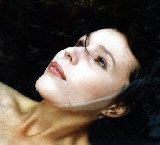Although banned by Czechoslovak authorities in 1964, Evald Schorm's Každý den odvahu (Everyday Courage) resurfaced four years later to win the Golden Kingfisher, the top award at the inaugural Finále, the festival of Czech films at Plzeň.
While Warsaw Pact tanks crushed the Prague Spring that same year, the festival lived on for one more season and again showed its independence with the 1969 Golden Kingfisher being shared by Vojtěch Jasný's Všichni dobří rodáci (All My Good Countrymen) and Slovak director Juraj Jakubisko's Zbehovia a pútníci (The Deserter and the Nomads). Together with Schorm's Každý den odvahu these films were, for the next 20 years, among the most prominent in the cannon of 100-plus banned works, until the Plzeň festival was resurrected in the wake of the Velvet Revolution.
 |
| Previous winner |
Bad omen?
The Finále 2000 festival was overshadowed by the news that the country's leading film studios, the Barrandov Studios in Prague, had been "sold to the Canadians" - although, for legal reasons, no one seemed to know the buyers or whether they plan to make films.
Given the fact that most Czech film makers cannot afford to shoot at Barrandov and are more likely to be financially dependent on Česká televize (Czech Television), the possible end to film production there would not mean the end of Czech cinema. On the other hand, the loss of income from the servicing of such international productions as Mission Impossible and Joan of Arc would be bound to have a knock-on effect in its further reduction of resources and technological expertise, analogous to a closure of Pinewood in the UK. But this is speculation.
In the meantime, there were 19 films in the official competition this year, including two co-productions with Slovakia and one with the USA, as well as Nikita Mikhalkov's Lazebnik sibirskii (The Barber of Siberia, 1999), in which Barrandov had a co-production interest. At least 15 films are currently projected for 2000-2001.
Given a total population less than that of Greater London and an audience that has declined by over 75% since the Communist years, this is by no means a negligible output.
Wartime reflections
An unusual aspect of this year's programme was the number of high profile films touching on the Jewish experience in the context of the Second World War. These included Musíme si pomáhat; Všichni moji blízcí (All My Loved Ones, 1999), which won the audience prize; and Pramen života (The Spring of Life, 2000), which was shown at Berlin. To these, one can add Karel Kachyňa's Hanele (1999), adapted from O smutných očích Hany Karadžičové (The Sad Eyes of Hannah Karajich) the thirties novel by Ivan Olbracht, about life in the Hasidic Jewish communities of Ruthenia.
 |
| True to life |
In this year's offering, Václav Čížek (Boleslav Polivka) agrees to hide a Jewish escapee, David, thus putting the lives of his family and neighbours at risk. When David fathers a child by Čížek's wife, this is not only a solution to the couple's problems with fertility, but also a legal protection against taking a Nazi lodger and the certainty of discovery.
 |
| The present and the past |
In order to hide David, Čížek has to accommodate the Nazis and is accused of being a collaborator. David's potential discovery is at first a guarantee of death, but finally a guarantee of life. Similarly, the member of the resistance who denounces Čížek had earlier rejected David's call for help.
While the theme has been dealt with in earlier Czech films such as Jiří Weiss's Romeo, Julie a tma (Romeo, Juliet and Darkness, 1960) and Ján Kadár's and Elmar Klos's Obchod na korze (The Shop on the High Street,1965), Musíme si pomáhat places its emphasis on a complex interplay of characters, in which common cause and humanity can be rapidly dissolved or reversed by political events. In this sense, the film is, as scriptwriter Jarchovsky suggests, as much about the present as the past.
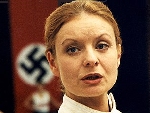 |
| Mothering for the Reich |
The central character, Greta, also gives birth to a baby by her Jewish lover, this time covering her "pairing" with a gay SS officer. While professionally written and directed by Milan Cieslar, it doesn't add to what Körner has expressed better elsewhere and the kitsch of Nazi racism combined with lesbian and gay stereotypes is familiar from other films.
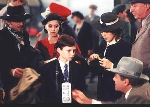 |
| Ratings chaser |
Old master returns
Hanele, by 75 year-old Karel Kachyňa is a much more persuasive (and subtle) account of the tensions within a community. Hanele (Lada Jelínková), a member of Hasidic Jewish community in Ruthenia, breaks with tradition through an initial commitment to Zionism and a subsequent desire to marry a Jewish "unbeliever" who rejects both Judaism and Christianity.
 |
| Overly Romantic? |
New talent emerges
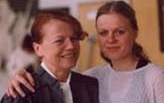 |
| True-life mother and daughter |
Ene bene, in fact, recalls Passer's two Czech films, Intimní osvětlení (Intimate Lighting, 1965) and his adaptation of Hrabal's Fádní odpoledne (A Boring Afternoon, 1965), in its emphasis on a world in which, by conventional film standards, nothing appears to be happening.
Its critical focus lies in its observation of the 1996 elections, an absurdist account of a local polling station only occasionally troubled by voters interested in the exercise of their democratic rights. In the meantime, a wife (Iva Janžurová) tries to persuade her convalescent husband (Leoš Suchařípa) that he is well enough to go to the station and vote. A feminine film full of wit and invention, it depends a great deal on the interplay between director and the acting partnership of Janžurová and her real life daughter, Theodora Remundová
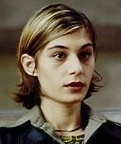 |
| Young, free, single |
Much more targeted on the youth market than Knoflíkáři, it mixes Ondříček's youth-friendly style, already apparent in Šeptej (Whisper, 1996), with Zelenka's dry wit to create an extremely entertaining film that was greeted by cheers and whistles and won the prize of the student jury.
Scripted at the same time that he was directing Knoflíkáři, the more recent film is not without thematic links to the former - coincidence, language, a radio programme, the obverse side of the medical profession, the generation gap, a car crash and a Japanese investigation of Czech family life. While Zelenka is likely to wax enthusiastic about the work of American independents, his sceptical eye is precisely focused on the Czech scene.
Darker side
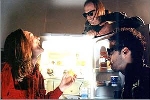 |
| Harsh reception |
Made on a shoestring, Czech critics seem to have rejected it as little more than an exercise in rehabilitation. While I found myself resistant to its opening scenes, it progressively settled into a powerful account of the downside of contemporary youth culture. Made initially on a day-to-day basis, it is a film of which we may well hear more.
 |
| Stylistic tour de force |
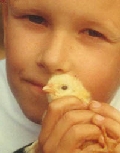 |
| Not to be pigeon-holed |
New Wave veterans
And what of the older directors of the 1960s New Wave? Drahomira Vihanová's The Voyage of Peter and Paul is due out in the summer and Jan Švankmajer, not New Wave but of the same generation, has a new film, Otesánek (The Wooden Boy / Greedy Guts), due in autumn. Jiří Menzel seems to have retreated to theatre after his plans to film Hrabal's novel Obsluhoval jsem anglického krále (I Served the King of England) fell through.
Věra Chytilová, however, was present with her two-part documentary, Vzlety a pády (Flights and Falls, 2000), an investigation of the lives and work of three Czech photographers, Václav Chochola, Karel Ludwig and Zdeněk Tmeje, told through their work, newsreel footage, interviews and environment. The film traces their lives from the 1930s through the Stalinist period and, in the case of the two surviving, to the present.
In her years as a model, Chytilová was married to Karel Ludwig, one of the most talented of the three, who specialised in his own brand of Hollywood-style portraits of female actors in the 1930s and 1940s. It's a fascinating journey through a hidden culture in which Chytilová herself was a participant. It is interesting, too, to see the original café where Hrabal set his Automat Svet (At the World Cafeteria) and Hrabal himself appearing in Chytilová's 1965 film version.
While Czech cinema undoubtedly has its problems with finance and access to world distribution, the variety of films at this year's festival revealed not only increased substance at the level of scripts but a level of maturity and creative self-confidence that augurs well for the future. Something is happening in Czech cinema, many of the increasing numbers of foreign guests noted, that isn't happening anywhere else in Central Europe. It may be happening despite the politicians who, Karel Kachyňa noted glumly, were not interested in cultural values, but one hopes that its momentum may be enough to generate change.
Peter Hames, 1 May 2000
Also of interest:
Books by the author:
Moving on:
- Return to the CER front page
- For more articles on Central and East European film see the Kinoeye Archive



